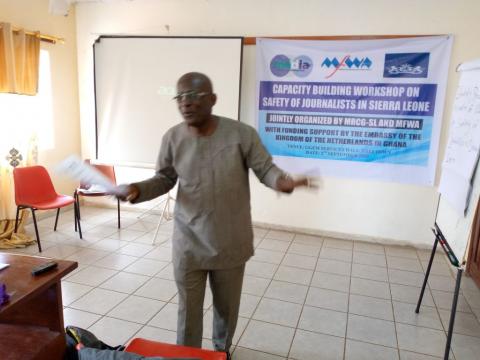By Mohamed Jaward Nyallay
The Media Reform Coordinating Group (MRCG) has conducted a day’s training for journalists on safety and security during reporting. The training which was co-organized by Media Foundation for West Africa, targeted more than 30 senior journalists from across the country.
Participants were drawn from diverse backgrounds, like the print, broadcast and online. Media practitioners were taken through presentations on issues like producing responsible fact based coverage whiles staying safe, risk awareness, physical safety, digital and cyber security.
In his opening remarks, MRCG Chairman, Dr Francis Sowa, said even though the country’s democracy has been evolving over the last decades, quite often journalists find themselves in harm’s way because of their job.
The state of the media report in Sierra Leone, which is normally done by the MRCG, has over the years extensively documented cases of physical assaults against journalists and followed them up to see if there are consequences as a result of police investigations.
Dr Sowa said: “Therefore this training is aimed at equipping journalists with requisite skills on how to protect themselves in the line of duty such as covering events and reportage.”
The training was funded by the Netherland Embassy based in Ghana as a way to promote press freedom and improve the capacity of journalist in the Sierra Leone.
Most of the training was facilitated by Sierra Leone based BBC Correspondent, Umaru Fofana.
During one of his sessions, Fofana said it’s important for journalists to consider their safety much more important than any story.
“No story is worth dying for,” he said. Whiles highlighting a number of tools journalists should ensure to have when on sensitive coverage duties, he said, “these are things that are important. Some of them we already know, but we don’t normally take them seriously.”
“I am happy MRCG is doing this,” Fofana stressed.
The training also saw an official from the Office of National Security (ONS) facilitating an hour long discussion on the topics: Working with security agencies and Identifying Safety Mechanisms Available to Journalists.
Francis Langumba Keili, who is the Director of Research and Planning Department at the ONS, facilitated the session.
In his presentation, Keili said much of their communication efforts has been aimed at cementing the relationship between the security sector and the media. He said the security sector and the media has to address what he described as the “mutual suspicion” between the two.
“Journalists should create a relationship with the security sector. I am not saying you should over familiarize yourself with them or lose touch of your professionalism. But if the security forces and the media understand each other, then it’s a win-win situation for everyone involved,” he explained.
He said the security sector has evolved over the years in terms of how they conduct communication. Much of that has been down to the reforms and trainings they have gone through and the composition of a communication documented for the sector that is known as “Security Sector Communication Policy and Strategy.”
Aisha Kamara is a reporter with Gbla Online TV and one of the 35 journalists who attended the training on Wednesday. She told Politico that this was the first time she is attending any training on safety.
Kamara said the most striking thing she learnt was about boarding public transportation and the security risks attached to that for a journalist.
“A journalist could be set up by whatever way according to what we were told today. You can be targeted through transportation because it is very important when we try to do our work. Someone who is aiming to get you will start tracing you,” Kamara said.
Her point is a reflection about how journalists should spot surveillance details that are aimed at them.
Lawrence Williams, who is the Editor of Freetong Post, a local newspaper, said following the training he is going to develop standard safety protocols for his newsroom.
Asked how much difference the training will make to what he already knows, he said: “This will make significant difference. I have learnt a lot in terms of how I approach issues, especially when we are faced with intense climate in terms of covering riots, protests and what have you.”
“It was important for me to be part of this training because I intend to cascade it down to my staff and I will draw up safety protocols for my institution,” Williams added.
Copyright © 2020 Politico Online








